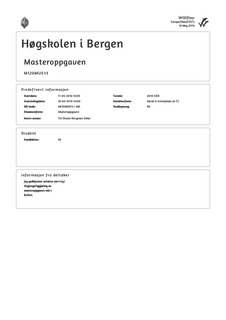| dc.description.abstract | In 2013 the Norwegian government constituted by royal resolution a committee led by Sten Ludvigsen. They were to consider the formal school subjects in comparison with the competences demanded in a futuristic society and professional life. In June 2015, the committee submitted a final report suggesting changes to schools, based on research done within the last 15-20 years within the fields of Education, Economics, and Social Sciences. The Ludvigsen-reports conclude that Norwegian schooling needs to reconsider its current structure, concept of competence, objectives, and bases for assessment. A strengthening of the practical aesthetic subjects (PAS), including music, is suggested due to their potential to facilitate student creativity and innovation skills. The PAS are valued for their characteristic type of knowledge, compared to scientific knowledge. The music subject in particular is valued for its assumed potential to facilitate student´s social and emotional learning (SEL) through musical interaction. The final Ludvigsen-report suggests concrete objectives in music education by which to facilitate and assess SEL. I argue there is a risk that this suggested approach to SEL could become a form of negative social control that potentially prevents the students´ genuine engagement in musical activities. This would potentially uphold the marginalization of music in schools, promote an unbalanced education, and facilitate miscommunication regarding music and its potential in Norwegian society. Consequently, schools will offer an unbalanced Music Education and facilitate ‘miseducation’ of future students. The students and the future society will arguably miss the benefits of a music education that reflects the significance of music as a social, emotional, cultural, aesthetic, and communicative phenomenon. My philosophical analysis concludes that the final Ludvigsen-report suggests an inadequate understanding of the significance of music, by failing to acknowledge its constantly expanding field of knowledge and its role in society, on the individual and collective level. In particular, music´s communicative nature is not fully acknowledged and reflected in the curricula. The suggestion to teach and assess emotional and social competences in music does not necessarily strengthen music education. Rather, it arguably works against it. Arguably, ‘artistic communication’ (‘artistisk kommunikasjon’) should be implemented as a sub-category within the main competence areas in primary schools. Quality musical activities that invite student participation should be given more space schools, also through interdisciplinary projects. Norwegian music education needs the following in order to reach its ultimate potential: more space in the school schedule, more qualified teachers who are familiar with and able to inspire and teach the full potential of music, and finally, necessary equipment and objectives that facilitate active music making. Such practices will arguably facilitate student mastery, ‘well-being’, identity acknowledgement and formation, social and emotional learning (SEL), as well as personal ‘emotion knowledge’, and secure cultural heritage while also encouraging creativity and fostering new expressions. This study encourages policy makers to trust the music, the qualified music teacher, and the musical human being. | en_GB |

